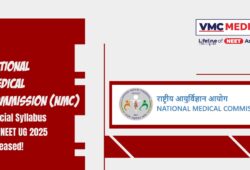National Medical Commission Reverses Decision on MBBS Passing Marks: What You Need to Know
 Posted On
Posted On
663 total views, 2 views today
In a surprising turn of events, the National Medical Commission (NMC) has decided to withdraw its earlier decision to lower the passing marks for the MBBS exam from 50 percent to 40 percent. This decision, which was initially met with both praise and skepticism, has now been reversed due to concerns about its retrospective application. In this blog post, we will delve into the details of this development, its implications for aspiring medical students, and the reasons behind the NMC’s change of heart.

The Initial Decision
Back in September, the National Medical Commission made headlines by announcing a significant alteration to the passing criteria for MBBS students. Under the revised guidelines, students were only required to achieve a minimum of 40 percent marks in aggregate for subjects with two papers. This change was accompanied by amendments to the Competency Based Medical Education (CBME) curriculum guidelines, marking a departure from the previously established standard.
The Controversy
The decision to lower the passing marks to 40 percent was met with mixed reactions. Advocates of the change argued that it would relieve some of the pressure on medical students, who already face a rigorous and demanding curriculum. They believed that this adjustment would lead to a more balanced and mentally healthy learning environment.
On the other hand, critics expressed concerns about the potential impact on the quality of medical education and the competence of future healthcare professionals. They feared that lowering the passing marks could lead to a decline in the standards of medical education, potentially compromising the quality of healthcare services in the country.
The Reversal
In a recent official notification released on the NMC’s website, the commission announced its decision to reverse the earlier change in passing marks. The notification cited “thorough consideration” as the reason for this reversal, emphasizing that implementing the change retrospectively would not be feasible.
The notification stated, “This is in continuation to new Amendment in CBME guidelines issued through ‘Corrigendum’ bearing No.F.No.U/1402t/B/2023-UGMEB dated OL.O|.ZOZ3 where a new amendment was introduced to the CBME Guidelines vide page number -58. It has been determined that a retrospective effect is not possible in this case after careful analysis of the subject.”
Implications for Aspiring Medical Students
This reversal of the decision to lower passing marks has significant implications for aspiring medical students across the country. Those who were planning to pursue MBBS with the expectation of a lower passing threshold will now need to adjust their academic goals accordingly. The reinstatement of the 50 percent passing mark standard means that students will face a more rigorous and competitive examination process.
It is crucial for prospective medical students to understand the implications of this change and prepare themselves accordingly. Achieving a 50 percent passing mark in both theory and practical examinations is no small feat, and it requires diligent study, dedication, and a deep understanding of the subject matter.
Reasons Behind the Reversal
The decision to reverse the lower passing marks for MBBS has left many wondering about the reasons behind the NMC’s change of heart. While the official notification mentions “thorough consideration” as the primary factor, it’s essential to delve deeper into the possible motivations behind this reversal.
- Academic Quality: One of the key concerns expressed by critics of the lower passing marks was the potential compromise in the quality of medical education. The NMC might have reconsidered its decision to maintain high standards in medical training and ensure that future healthcare professionals are well-prepared for their roles.
- Public Perception: The NMC may have been influenced by the public’s perception of the change. If there was significant backlash or skepticism about the lowered passing marks, the commission might have decided to revert to the previous standard to maintain public confidence in the medical education system.
- Future of Healthcare: The commission may have also considered the long-term impact on the healthcare sector. High-quality medical education is essential for producing competent doctors who can provide quality healthcare services. Reinstating the 50 percent passing mark could be seen as a step towards safeguarding the future of healthcare in the country.
Final Thoughts
The National Medical Commission’s decision to reverse the lowering of passing marks for MBBS students has stirred up discussions and debates within the medical community and among aspiring medical students. While the initial change aimed to reduce the academic burden on students, concerns about its impact on the quality of medical education seem to have prevailed.
Aspiring medical students must now adapt to the reinstated 50 percent passing mark standard and prepare themselves diligently for the challenges ahead. The reversal of this decision underscores the importance of maintaining high academic standards in medical education and ensuring that future healthcare professionals are well-equipped to meet the demands of their profession.
In conclusion, the NMC’s reversal of the decision highlights the complexities and considerations involved in shaping the future of medical education in the country. It serves as a reminder that decisions in the field of healthcare education must strike a delicate balance between alleviating student stress and upholding the highest standards of competence and quality in healthcare provision.




